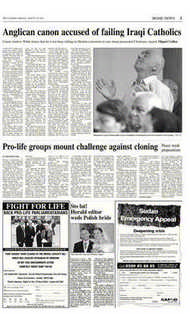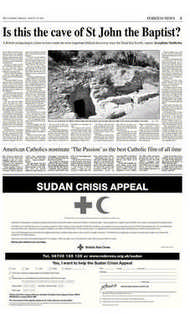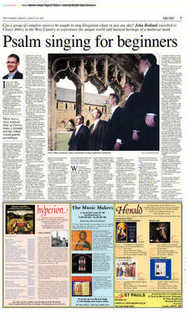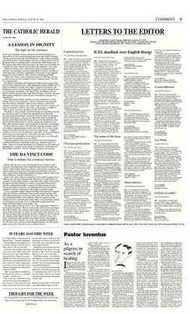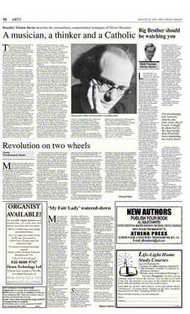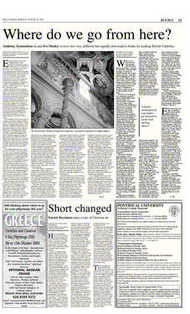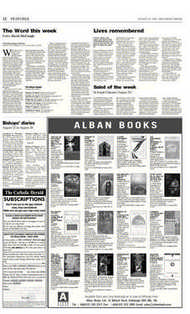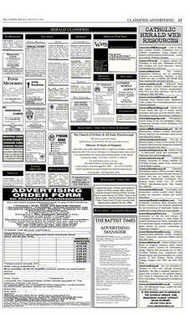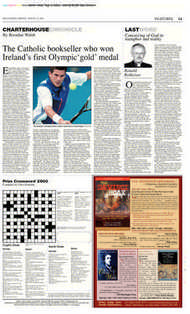Page 12, 20th August 2004
Page 12
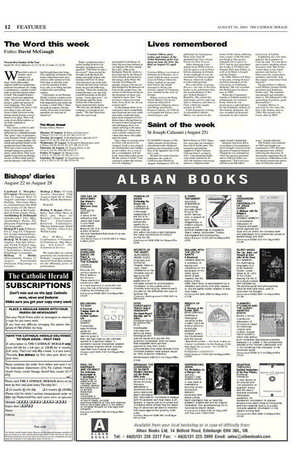
Report an error
Noticed an error on this page?If you've noticed an error in this article please click here to report it.
Tags
Share
Related articles
David Mcgough
Father David Mcgough
Father David Mcgough
Father David Mcgough
The Word this week
Father David McGough When faith is alive it reaches out to embrace all peoples and all times. Such faith neither imposes itself nor manipulates enforced recruitment. Its vitality is spontaneous, a deeply rooted faith in God that attracts others to itself. The prophet Isaiah’s vision voiced such optimistic faith: “The Lord says this: I am going to gather the nations of every language. They shall come to witness my glory. I will give them a sign, and send some of their survivors to the distant islands that have never heard of my glory. They will come, from all the nations, to my holy mountain in Jerusalem.” This vision, so full of confidence for the future, was addressed to a dispirited people. The “glory” days of Jerusalem were long past. Israel’s political might was in steep decline. The moral and spiritual health of the people had fared little better. They had come to trust in the strength that power and prosperity could afford. They were rapidly losing both the fleeting success of their earlier history and the intimacy with God that had brought them into being. This optimistic invitation to the future called them back once more to a life centred on God. Only then would they rediscover the meaning of their lives, and, in so doing, become a light to the surrounding nations.
Christianity, in our Western World, is facing a similar crisis. The Christian gospel is seen as both unattractive and irrelevant to today’s world. Why? Does the fault lie entirely with the society of our day, or are there questions we must ask of ourselves? Today’s gospel provides a useful starting point for our thoughts. In response to the question: “Will there be only a few saved?” Jesus invited his disciples to think about the nature and depth of their relationship with God. To those who had grown up in the faith of Israel and had come to know Jesus, he gave the following warning. “Once the master has locked the door, you may find yourself knocking on the door saying – Lord, open to us.” As the passage unfolds, those locked out of the master’s house protested their claims. “We once ate and drank in your company, you taught in our streets.” We, like those disciples, have grown up surrounded by the things of God. We have been blessed in our baptism. We have shared the Lord’s Table at the Eucharist. Week by week we have been fed by the Word of God solemnly proclaimed in the Liturgy of the Word. We can take such things for granted, ceasing to be moved and changed by the presence of God. In the gospel story, the master of the house dismisses the insistence of those who claimed to know him: “I do not know where you come from. Away from me, all you wicked men!” As the passage draws to its conclusion, Jesus warned that men from east and west, north and south, would take their place in the kingdom of God before those who had been so favoured in their background and upbringing. Jesus was clearly referring to the many “non-believers” whose lives were a clearer witness to his values than those who called upon his name.
Only when we remain close to Christ will our lives be changed. Faith is not a forgotten membership card, hidden in our wallets. It is a way of life; a communion with the Lord. Such faith makes possible the vision of Isaiah:“I am coming to gather the nations of every language.”
blog comments powered by Disqus




